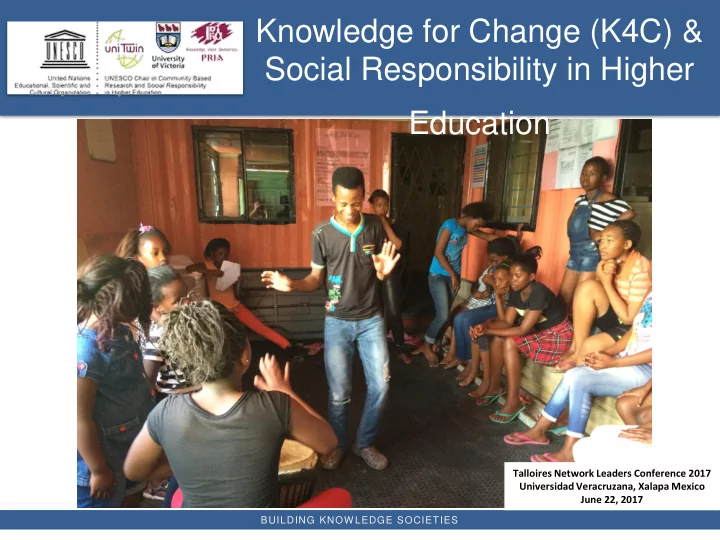

Knowledge for Change (K4C) & Social Responsibility in Higher Education Talloires Network Leaders Conference 2017 Universidad Veracruzana, Xalapa Mexico June 22, 2017 BUILDING KNOW LEDGE SOCIETIES
About UNESCO Chair • Partnership between UVic & PRIA since 2012 • Created in the aftermath of the 2 nd UNESCO Conference on Higher Education (2009) • Supports North-South-South and South-South partnerships, building and enhancing ‘knowledge democracy’ • Strengthens engagement between communities, civil society & academia • Advocates mainstreaming of Community University Engagement in academic curriculum • Promotes discourse on ‘Social Responsibility in Higher Education’ BUILDING KNOW LEDGE SOCIETIES 2
Socially Responsible Higher Education “ With the privilege to pursue knowledge, comes the civil responsibility to engage and put that knowledge to work in the service of the humanity” (5 th GUNi Report on Higher Education, 2014) Higher education, in particular, has the social responsibility to generate new knowledge for addressing societal challenges & achieve SDGs HEIs need to explore their responsibilities, in the larger context, within their core functions as educational and research institutions Need to link their missions to achievement of SDGs by practicing ‘ engaged teaching, engaged research & engaged service ’, linked to SDG goals relevant to local context. BUILDING KNOW LEDGE SOCIETIES 3
GUNi6: Towards a Socially Responsible University “ Social responsibility emerges as the need to reconsider the social relevance of universities in light of the encounter of the local with the global, regarding priorities, demands, impacts and knowledge needs in the context of globalization. The competitiveness of nations should be balanced with inclusive social development and sustainability of the entire global population ” (6 th GUNi Report on Higher Education, 2017) Report deals with the dual responsibilities of universities at local and global scales for contributing to a more equitable and sustainable society. Includes contribution by 86 authors across 28 countries Full report is open access and available at: http://www.guninetwork.org/files/download_ full_report.pdf BUILDING KNOW LEDGE SOCIETIES 4
Knowledge for Change (K4C) International consortium for capacity building in CBPR. Need for learning by doing and critical reflections of values, ethics and methodology Overall objective is dual: building capacity in next generation and promotion of new co-constructed knowledge to address critical societal issues, in line with UN SDGs. Developed through partnership with local universities and civil society in eight countries BUILDING KNOW LEDGE SOCIETIES 5
K4C: Highlights Development of CBPR research capacities for co-creation of knowledge, under leadership of UNESCO Chair. Creation of a global trans-disciplinary research training partnership between HEIs & CSOs, working together in 8 hubs Development of a Mentor Training Program (MTP) curriculum based on online & f2f methodology. Training 2000 in the next 5 years, creating and supporting hubs in global South and excluded North Culturally relevant output & open access learning materials &resources in local languages BUILDING KNOW LEDGE SOCIETIES 6
Connect with UNESCO Chair Dr Rajesh Tandon @RTandon_PRIA @UNESCOchairCBR/ Email: rajesh.tandon@pria.org Websites: www.unescochair-cbrsr.org www.pria.org www.marthafarrellfoundation.org BUILDING KNOW LEDGE SOCIETIES 7
Recommend
More recommend